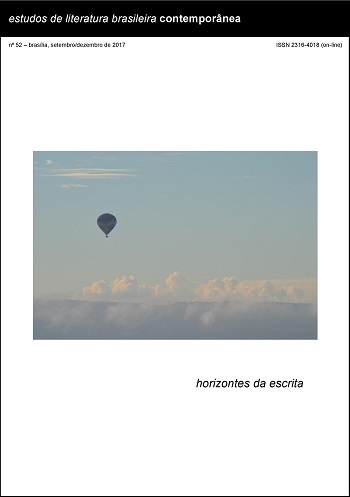Sound spectrum:
voice, body and democracy in Ricardo Domeneck
DOI:
https://doi.org/10.1590/2316-4018529Abstract
The book a cadela sem Logos (2006), by Ricardo Domeneck, seeks to resignify the performative role of the voice, in a critical gesture toward Brazil’s consensual democracy, which was consolidated during this period. To do this, the book employs a series of structural features that expose the importance of insignificant phonetic elements (i.e., those that do not contribute to the meaning of speech) associated with the context created by the act of vocalization.This article aims to retrace these procedures, showing how such a strategy has a political dimension through which it seeks to disrupt the division between anatomy and semantics, public and private, voice and speech, by listening to the body, and hovering on the limit between the individual and the social.
References
AGAMBEN, Giorgio (2014). Categorias italianas: estudos de poética e literatura. Tradução de Carlos Eduardo Schmidt Capela e Vinícius Nicastro Honesko. Florianópolis: Edufsc.
ARISTÓTELES (2006). De anima: livros I, II e III. Tradução de Maria Cecilia Gomes dos Reis. São Paulo: Editora 34.
ARISTÓTELES (1991). A política. Tradução de Roberto Leal Ferreira. São Paulo: Martins Fontes.
AUSTIN, John Langshaw (1975). How to do things with words. Cambridge: Harvard University Press.
BENVENISTE, Émile (2006). Problemas de linguística geral II. Tradução de Eduardo Guimarães et al. Campinas: Pontes.
DERRIDA, Jacques (1998). La voix et le phénomène: introduction au problème du signe dans la phénoménologie de Husserl. Paris: Presses Universitaires de France.
DOLAR, Mladen (2006). A voice and nothing more. Cambridge: MIT Press.
DOMENECK, Ricardo (2005). Carta aos anfíbios. Rio de Janeiro: Bem-Te-Vi.
DOMENECK, Ricardo (2006a). a cadela sem Logos. São Paulo: Cosac Naify.
DOMENECK, Ricardo (2006b). When they spoke I / confused cortex / for context. London: Kute Bash Books.
DOMENECK, Ricardo (2006c). Garganta com texto. Perfomance exibida no Programa Entrelinhas da TV Cultura, São Paulo, 20 dez. Vídeo. Disponível em: <https://www.youtube.com/watch?v=sZwFos5meBU>. Acesso em: 29 set. 2016.
DOMENECK, Ricardo (2009). Sons: Arranjo: Garganta. São Paulo: Cosac Naify.
DOMENECK, Ricardo (2011). Entrevista a Guilherme Gontijo Flores. Revista Escamandro, Curitiba, 25 nov. Disponível em: <https://goo.gl/d9Ph6K>. Acesso em: 29 set. 2016.
JAKOBSON, Roman (2001). Linguística e comunicação. Tradução de Izidoro Blikstein e José Paulo Paes. São Paulo: Cultrix.
LACOUE-LABARTHE, Phillipe (2000). Phrase. Paris: Christian Bourgois.
LATOUR, Bruno (2004). Politiques de la nature: comment faire entrer les sciences en democratie. Paris: La Découverte.
NANCY, Jean-Luc (2016). Demanda: literatura e filosofia. Organização de Ginette Michaud. Tradução de João Camillo Penna, Eclair Antonio Almeida Filho e Dirlenvalder do Nascimento Loyola. Florianópolis: Edufsc.
NODARI, Alexandre (2015). Eu, pronome oblíquo. Tradução em Revista, Rio de Janeiro, n. 19, p. 18-31.
PERLOFF, Marjorie (1999). The poetics of indeterminacy: Rimbaud to Cage. Evanston: Northwestern University Press.
RANCIÈRE, Jacques (1996). O desentendimento: política e filosofia. Tradução de Ângela Leite Lopes. São Paulo: Editora 34.
SERRES, Michel (1992). Le contrat naturel. Paris: Flammarion.
STERZI. Eduardo (2004). Todos os sons, sem som. In: SÜSSEKIND, Flora; GUIMARÃES, Júlio Castañon. (Org.). Sobre Augusto de Campos. Rio de Janeiro: 7Letras; Casa de Rui Barbosa. p. 95-115.
Downloads
Published
Issue
Section
License
Authors who publish in this journal agree to the following terms:
a) The authors maintain the copyright and grant the journal the right of first publication, the work being simultaneously licensed under the Creative Commons Attribution License-Non Commercial 4.0 which allows the sharing of the work with acknowledgment of the authorship of the work and publication this journal.
b) Authors are authorized to enter into additional contracts separately, for non-exclusive distribution of the version of the work published in this journal (eg publish in institutional repository or as a book chapter), with authorship recognition and publication in this journal.
c) Authors are allowed and encouraged to publish and distribute their work online (eg in institutional repositories or on their personal page) after the editorial process, as this can generate productive changes, as well as increase the impact and citation of published work (See The Effect of Free Access).
d) The authors of the approved works authorize the magazine to, after publication, transfer its content for reproduction in content crawlers, virtual libraries and the like.
e) The authors assume that the texts submitted to the publication are of their original creation, being fully responsible for their content in the event of possible opposition by third parties.


